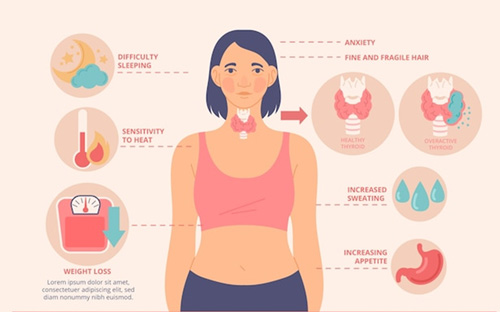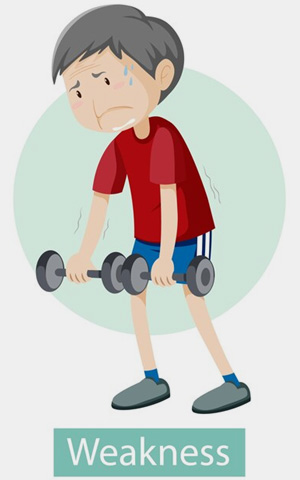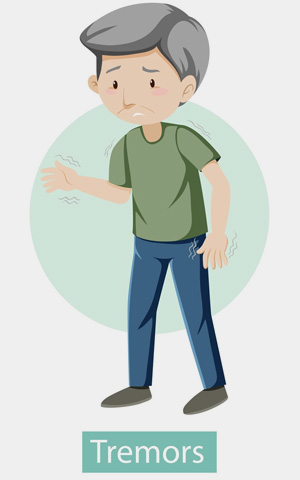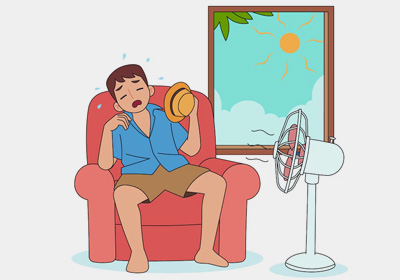Introduction
It’s an immune system disorder of the butterfly – shaped gland in the throat (thyroid), that may cause hyperthyroidism & results in enlarged thyroid.
Understanding Grave’s Disease
Grave’s disease is an autoimmune disorder affecting the thyroid gland, leading to hyperthyroidism and an enlarged thyroid (goitre). The thyroid, a butterfly-shaped gland in the throat, becomes overactive, producing excessive thyroid hormones.
Types
- Thyroid Stimulating Immunoglobulins
- Thyroid Growth Immunoglobulins
- Thyrotropin Binding – Inhibiting Immunoglobulins

Causes of Grave’s Disease
The exact cause is unclear, but it may involve genetic or environmental factors, it may occur by exposure to severe stressors & high levels of subsequent distress such as post – traumatic stress disorder .
Genetic – a genetic predisposing for grave’s disease is seen, with some people more prone to develop TSH receptor activating antibodies due to genetic cause.
Symptoms of Grave’s Disease
- Enlarged Thyroid, Irritability
- Muscle Weakness
- Sleeping problems
- Fast heartbeats
- Weight loss
- Poor tolerance of heat
- Anxiety
- Tremors of hands or fingers
- Warm & moist skin
- Increased perspiration
- Goitre
- Changes in menstrual cycle
- Easy bruising

Exophthalmos
- Bulging of Eyes
- Which causes the eyes to move out of the socket in one or both eyes
- Erectile dysfunction
- Reduce libido
- Frequent bowel movements
- Bulging eyes
- Thick red skin on shins or the top of foot

Risk Factors
Positive family history, triggering of disease due to stress, smoking, with other autoimmune disease like Rheumatoid arthritis, crohn’s disease, women (mainly during pregnancy) carry higher risk of developing grave’s disease as compared to men
Infectious trigger – In later life due to a viral or bacterial infection may trigger antibodies, and may cross react with TSH receptors called as antigenic mimicry.
Complications of Grave’s Disease
It may lead to a lot of complications – the most dangerous is a thyroid storm.
Others may include Weak Bones, Heart Failure.
Diagnosis
May present clinically with one or more characteristic signs:
- Rapid heartbeat ( 80% )
- Palpable goitre ( 70% )
- Tremor (40% )
- Exophthalmos periorbital edema( 25% )
- Fatigue ( 70% )
- Weight loss ( 60 % )
- Heat intolerance ( 55% )
- Tremulousness ( 55% )
- Palpitations( 50 % )



Two signs are truly diagnostic of Grave’s Disease (not seen in other hyperthyroid conditions) Exophthalmos & non pitting EDEMA (pretibial myxedema)
- Ultrasound examination of thyroid
- Blood tests - thyroid profile
- Biopsy
- Thyroid antibody test
Homoeopathy and Grave’s Disease
Homoeopathic treatment for Grave’s disease focuses on optimising the immune system and managing symptoms through individualised remedies. The treatment is tailored to each patient's unique symptoms and overall health profile.
Homoeopathic Management for Grave’s Disease
- Iodum
thin, dark complexion , enlarged glands, chronic inflammation , nutritive disturbances with pathological conditions , Anxiety, depressed, suicidal tendency.
- Spongia tosta
swollen glands, heaviness in body, stitches & dryness in throat, sore throat with thyroid, clears throat constantly, Anxiety, fear, excitement increases cough.
- Natrum Mur
Taking of excessive salt causes profound nutritive changes, anaemia, debility, mapped tongue Depressed, consolation aggravates, irritable, hasty, tears with laughter.
- Kali Iodium
glandular swellings, produces catarrhal inflammations, Irritability, cruelty, extremely nervous.
Benefits of Homoeopathic Treatment
- Individualised Care: Homoeopathy recognizes that each person is unique. A homoeopath will assess your symptoms, medical history, and lifestyle to prescribe a personalised treatment plan tailored to your needs.
- Gentle and Natural: Homoeopathic remedies are derived from natural substances and are known for their minimal side effects. They work in harmony with the body, promoting self-healing and overall well-being.
- Holistic Approach: Homoeopathy takes into account not only the physical symptoms but also the emotional and mental aspects of an individual. It aims to restore balance at all levels, providing comprehensive care.
- Long-Term Relief: By addressing the underlying causes of Ulcerative Colitis,homoeopathy strives to achieve long-term relief and improved quality of life.
Consulting a Homeopath
To effectively manage Grave’s disease with homoeopathy, it is crucial to consult a Sanjivani qualified homoeopath. The Sanjivani homoeopathic treatment plan is highly individualised and considers the patient's physical and mental symptoms, overall health, and specific needs. The goal is to reduce the intensity and frequency of symptoms and address the root cause of the disorder.
Sanjivani Homeopathy Clinic USP
- No homoeopathy Dietary Restrictions:
Allows patients to enjoy foods like onion, garlic, and coffee, ensuring a stress-free treatment journey.
- 24/7 Online Consultations:
Enables convenient access to doctors with detailed counseling, history management, and follow-ups.
- Highly Skilled Team:
Experienced BHMS and MD doctors, supported by multilingual and professional staff.
- Patient-Centric Care:
Simplifies treatment with modern, adaptable solutions and clear communication.
Click Here for Detailed "Sanjivani USP"
FAQ's
- What is homoeopathy ?
Homoeopathy is a holistic science which belives in the law of Similia Similibus Curenter i.e Like Cures Like .It was discovered by Dr Samuel Christian Hahnemannn in 1796.
- Is there any side effects of homoeopathy?
As homoeopathic medicines are made from natural substances this medicines have no side effects and are completely safe to consume
- Is there any diet restriction to take homoeopathic medicines?
There are no diet restrictions for homoeopathic medicines. One should only avoid eating or drinking any liquid other than water at least 30 minutes before and after taking homoeopathic medicines.
Click Here for "Frequently Asked Questions."
Conclusion
Sanjivani Homoeopathic treatment for Grave’s disease offers a holistic approach by optimising the immune system and managing symptoms. The constitutional approach of Sanjivani homoeopathy considers both physical and mental symptoms, aiming to treat the disorder from its root cause. For effective treatment, it is essential to consult a Sanjivani homoeopathic physician who can provide personalised care and guidance.
Disclaimer: The information provided in this blog is for educational purposes only and should not be considered medical advice. Please consult with a qualified healthcare professional before starting any treatment for Grave’s disease or any other medical condition.


